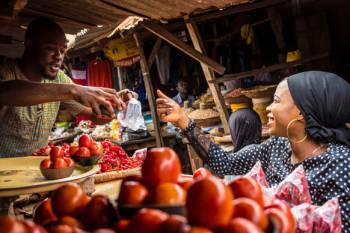MONHEIM/GERMANY, 22 July 2021: Bayer reaffirmed its commitment to promoting increased worldwide consumption of fruits and vegetables with the announcement of new portfolio innovations and a business strategy for horticulture.
The strategy focuses on activities that deliver tailored solutions to the farm, advance sustainable innovations on the farm and address value chain and consumer needs beyond the farm.
“Only a fraction of the global population comes close to consuming the daily recommended serving of fruits and vegetables,” Bayer head of global vegetable seeds Inci Dannenberg, said.
“In the UN’s International Year of Fruits and Vegetables, Bayer is doubling down on its approach to enabling growers and partners to address the barriers to improving fruit and vegetable consumption in order to achieve Health for All, Hunger for None,” Dannenberg added.
The horticulture strategy is underpinned by Bayer’s leading genetics, crop protection and digital capabilities, which provide growers with the tools they need for smarter, on-farm decision making, and consumers with the quality and nutrition they need to promote a healthy lifestyle.
Delivering high-quality seeds and solutions to the farm
With the largest investment in research and development in the industry, Bayer is working to realize a core part of their ‘to the farm’ strategy – to provide improved innovation in genetics, crop protection and digital.
“Through innovative, tailored solutions we are helping fruit and vegetable growers around the globe to produce marketable yields that meet the safety, quality and nutrition standards their customers expect,” said Kamel Beliazi, Crop Strategy Lead of Fruits and Vegetables at Bayer. “This is a core part of our business strategy in Horticulture.”
The result of this R&D investment is seen in Bayer’s recent portfolio innovations around the world. Vynyty Citrus is an innovative device – a container with an active liquid inside – that does not generate resistance or residues in harvests or in the environment. It is the first such biological product on the market that is formulated with pheromones and natural pyrethrum to control pests in citrus fruits. The product is currently being used in Spain and will soon be available to growers of citrus and other crops in other Mediterranean countries.
Within Vegetable Seeds, Bayer is continuing to invest in ensuring its pipeline reflects not just the changing needs of growers and the value chain but of diverse consumers. The company is leveraging predicative consumer liking models and sensory insights from around the world at every stage of its pipeline development to deliver ground-breaking flavor while maintaining critical agronomic traits that are essential to a healthy harvest.
Advancing sustainable innovations on the farm
Every horticulture innovation is developed with two goals in mind – helping growers sustain their business and sustain the planet. This is especially important when it comes to smallholder farmers who are responsible for feeding more than half of the population in low and middle-income countries. As part of Bayer’s commitment to reaching 100 million smallholder farmers by 2030, the company is partnering with organizations to provide the tools, training and resources smallholder farmers need to help minimize risk and grow their businesses sustainably.
With data-driven innovations at the forefront of this effort, Bayer is partnering with Rabobank to develop digital solutions for smallholder farmers in Southeast Asia. Smallholder farmers need access to digital farming tools more than anyone else to help unlock their farming potential. The company recently announced the signing of an agreement with Rabobank, including a plan for two pilots to be conducted in Vietnam and the Philippines over the coming months. This new partnership represents another step toward achieving food security for a growing population.
Through its Bridging the Seed Gap initiative, Fair Planet and Bayer are also providing training to help smallholders in Africa best grow hybrid vegetable seeds adapted for their local growing conditions. This combined with sustainable practices reduce inputs and costs for smallholders and save time while improving yield quality and increasing income.
Collaborating to address needs beyond the farm
Beyond the farm, consumers place great importance on safe, healthy and sustainably produced food. In order to respond to these needs, Bayer is working from field to fork to promote market access for growers around the world by connecting them with food value chain partners and helping them adapt to meet changing consumer tastes.
Most recently, the company announced its membership in the Sustainability Initiative for Fruits and Vegetables (SIFAV), alongside other produce industry leaders. SIFAV is a cross-industry platform dedicated to scaling up collaboration and reducing the environmental footprint of fresh food. Through a collaborative, action-oriented approach, and clearly defined sustainability targets, Bayer and SIFAV are focused on finding new solutions to help reduce the carbon footprint on priority crops, reduce food loss and waste, and reduce of water use, among other focus areas.
These announcements were made as Bayer prepares to host the event, ‘It’s Crunch Time: Solving the world’s nutritional crisis through increased produce consumption’, part of the company’s Future of Farming Dialogue virtual event series.
The ha taken place recently was joined by leaders from across the produce value chain, including Barbara Bray MBE, Alo Solutions, Shoshan Haran, CEO of Fair Planet, and Paul Mastronardi, President and Chief Executive Officer of Mastronardi Produce Limited.




















